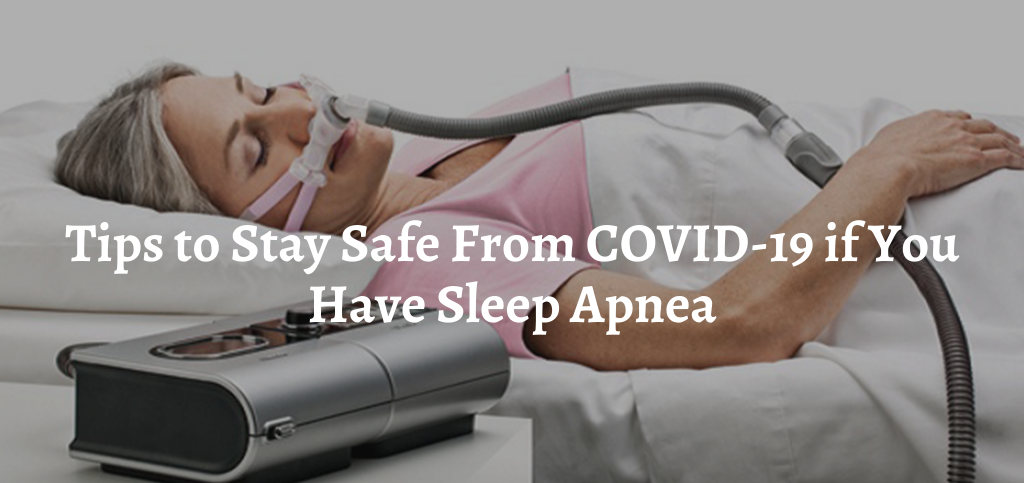Tips to Stay Safe From COVID-19 if You Have Sleep Apnea
Posted by Admin on 8th Jun 2021
The COVID-19 pandemic has wreaked havoc on the healthcare system of many countries. In India, the situation is becoming worse with each day. Several hospitals and healthcare units are running out of beds with an ever-increasing patients requiring treatment. Since this relatively new SARS viral strain has doubly mutated, the new variants are affecting even young healthy people. This has added more stress and fear to the comorbid patients. So, what does this variant spreading like wildfire mean for people with other underlying medical conditions like sleep apnea? How can they protect themselves from this deadly disease? Keep reading to know more about it.
Check out MyCPAP to buy CPAP masks at the best rates.
Are Sleep Apnea Patients at Higher Risk of COVID-19?
Since it is a new virus strain, scientists are still studying its virulency and how it affects people. But, what we know for sure is that two critical OSA-related factors have also been connected to an increased likelihood of significant COVID-19 consequences. These two risk factors are age and chronic medical conditions. Along with this, sleep aspiration is also considered a potential risk factor.
Underlying medical conditions
People with comorbidity have a higher COVID-19 mortality rate than any other. These chronic conditions include diabetes, lung ailments, heart disease, and respiratory illness like sleep apnea and COPD. Since OSA has been connected to other disorders like diabetes and heart disease, these people are most likely in this high-risk group.
Age
Since the beginning of the pandemic, doctors have pointed to the correlation between age and the incidence of COVID-19 complications. It is mainly due to the compromised immune functioning and inflammation response. As the majority of sleep apnea patients are above 65 years old, they are at risk of developing Coronavirus.
● Sleep Aspiration
Coronavirus affects the lower part of the lungs by inhaled air and fluid aspiration from the saliva and nose that drains from the mouth. This is critical for CPAP users to know because good hygiene and health measures are required to make sure that the air from the mask does not promote pathogen infection.
Are you looking for CPAP masks? MyCPAP has a vast collection of CPAP masks for sale.
Along with the well-known standard COVID-19 prevention protocols and guidelines, sleep apnea patients must take the following extra precautionary measures to stay protected.
1. Get Good Sleep
Multiple studies prove that good sleep is vital to keep the body’s immune system healthy to fight off foreign antigens. Also, adequate sleep aids your body in a quick recovery from any illness. It is critical not only to have an early bedtime but also to get quality rest.
2. Keep up with CPAP Compliance
Since sleep apnea affects your sleep, following the CPAP therapy protocol is more important now than ever. CPAP therapy is essential for you to remain healthy and lower the risk of developing life-threatening complications. So, do not skip your therapy. In fact, recent research shows that using BiPAP and CPAP devices may help some COVID-19 patients to alleviate the symptoms.
3. Maintain Good Hygiene
Sleep apnea patients must not touch their face frequently as it may risk any pathogen infection entering the system through the mouth, nose, or eyes. Wash your hands properly with soap and sanitize the touched surface occasionally. The WHO protocol suggests maintaining respiratory hygiene such as wearing N95 masks, covering the face with an elbow or paper tissue while sneezing or coughing is important to prevent the spread of COVID-19. Make it a habit of sanitizing your hands before you touch the sleep apnea mask, device, or tube.
4. Keep Your CPAP Device Far Away From Other people
In case you use CPAP equipment for your therapy, make sure you place it far to avoid the people from coughing, breathing or sneezing on it.
5. Clean Your CPAP Equipment
To minimize the risk of any pathogenic infection, clean your CPAP equipment at least once a day, including the CPAP masks, humidifier tank, and tube. Also, wash your face before you put on the device for your therapy.
6. Change the Filter
Read the instruction manual of the CPAP device and change the filter as instructed. Most models require a filter replacement after at least two weeks of regular use.
7. Watch out for Symptoms
As sleep apnea patients are more likely to develop complications from Coronavirus, you must pay attention to your symptoms. In case you develop any fever, breathing trouble, or dry cough, contact a primary health care center before the symptoms worsen.
Want to buy top-quality sleep apnea masks? Reach out to MyCPAP to buy CPAP masks online.


